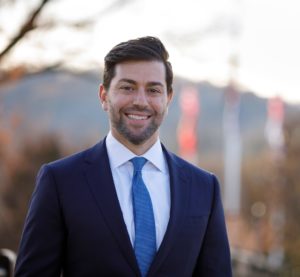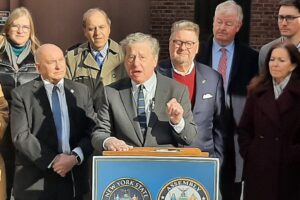
Adam Schleifer, a democratic primary candidate for the NY-17 Congressional seat, recently penned an op-ed about the reasons many Americans do not vote. But he missed a major factor in low voter participation rates: the growing sense that ultra-wealthy candidates, like Schleifer, are able to buy their way into elected office.
Schleifer has framed himself as a champion of voter participation in recent weeks, unveiling a “Voting Rights Act of 2021” and hosting events on the topic, but he has failed to mention that he had, by the end of April, given or lent his own campaign a staggering $1,917,000. That’s small change to Schleifer, who owns between $25 million and $50 million in stock from Regeneron, the multi-billion-dollar pharmaceutical company his father co-founded. But it’s far more than any other candidate in the race can afford.
Schleifer’s contributions to his own campaign have allowed him to raise almost three times as much money as any other candidate in the race, without spending nearly as much energy on fundraising. That means he can hire more staff, buy more ads, send more mailers. Schleifer knows that money matters in elections, or he wouldn’t have spent nearly $2 million on his campaign. And he’s right: in 90 percent of House races, the candidate who spends the most money wins.
Schleifer’s contributions are not an isolated issue; they speak to the growing trend of wealthy candidates, like former New York City Mayor Michael Bloomberg, President Donald Trump, and Florida Governor Rick Scott, taking advantage of the opportunity to throw virtually unlimited funds at their own campaigns. It’s just one of many ways the richest Americans exercise outsized influence on politics and policy.
The United States’ tolerance of self-funded campaigns means that candidates with enough money to out-spend their competition, like Schleifer, have a huge advantage in elections. It means our elected officials are less likely to represent the interests of working-class voters. It means the disaffected electorate, who Schleifer calls “inattentive, absentee” gods of the political process, know their votes will never matter as much as a wealthy candidate’s piles of money. That all makes it a lot harder to convince busy people that their votes matter enough to justify a trip to the polls.
If Schleifer wants to shape the U.S. into a true democracy, his proposals to make Election Day a federal holiday and abolish the electoral college would be a good start. But there’s something he can do much sooner: he can stop self-funding his campaign. If he believes he’s best equipped to serve us, he should fight for our votes on his own merits. A democracy in which the richest candidate can buy the election is no democracy at all.
Rebecca Blair






